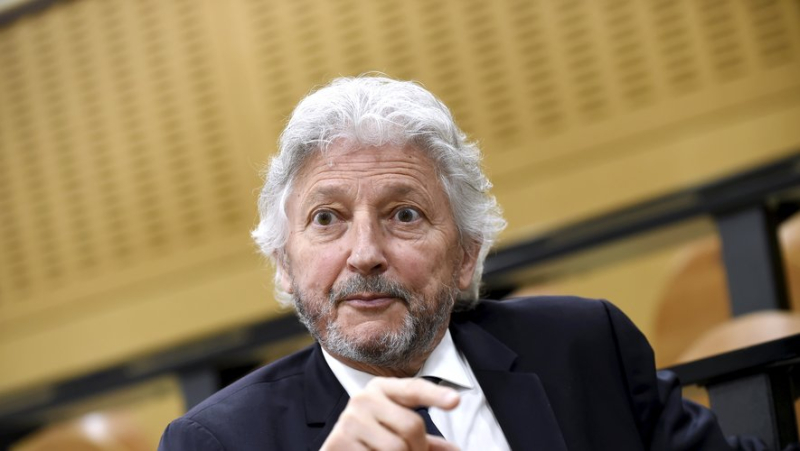Legislative elections 2024: absolute or relative majority, resignation of the president… Dominique Rousseau deciphers the constitutional issues of the ballot

Dominique Rousseau, professeur émérite de droit constitutionnel à la Sorbonne. Midi Libre – SYLVIE CAMBON
Le constitutionnaliste montpelliérain, professeur émérite de droit public à la Sorbonne, analyse, à la lueur du droit et de l’Histoire, ce qui pourrait advenir à la tête du pays au terme du second tour.
The President says that a success of the RN or the New Popular Front would cause chaos. First of all, there is no risk of constitutional chaos, also in the event of a relative majority?
An absolute majority for the National Rally or the New Popular Front would produce neither civil war nor chaos. The Fifth Republic has already experienced situations of cohabitation or alternation, and while many predicted chaos, including in 1974 when Giscard-d'Estaing was elected president on the pretext that the Constitution had been written by General de Gaulle for the Gaullists, the institutions have always functioned. This was also the case during the various cohabitations. So let's stop being dramatic.
If the ballot boxes do not deliver an absolute majority, it will then be up to the President of the Republic to designate a personality responsible for building a majority coalition, according to the model in Germany, Spain and in any parliamentary system. It won't be a disaster anymore. We have also clearly seen, since 2022, that a minority government has been able to pass important laws, such as pension reform or the law on immigration. The oppositions being divided, therefore in the minority, they were unable to agree to overthrow the government.
And if this time they manage to pass a motion of censure ?
The President can no longer dissolve the national assembly during the year following the first dissolution, he would still have the possibility, as was the case in Italy, to appoint a government of technicians, of experts , to ensure the continuity of the State at least until June 2025, when it would regain the right to dissolution. This technical government would manage current affairs and draw up the budget, which is already no small matter considering the country's deficit or military aid to Ukraine. This would not be a first under the Fifth Republic. This is what Valéry Giscard-d’Estaing did in 1976, after the resignation of Jacques Chirac. He appointed as Prime Minister Raymond Barre, then considered “the best economist in France”. It was only later that Mr. Barre entered politics.
But can't a technical government also be overthrown ?
Obviously, the national assembly could put an end to this government at any time if the parliamentary groups agree to this.
Could this be a political tool to push President Macron to resign ?
This has already happened in history, under the Third Republic, with a President pushed to resign but by a majority group. In 1877, Mac Mahon dissolved the Chamber of Deputies by asking the people to send him a conservative majority. Ultimately it was the Republicans who remained in the majority and Gambetta had this famous formula: “the president will have to submit or resign”. Mac Mahon first submitted by appointing a President of the Republican Council, but after two years, in 1879, when a law was proposed for his signature to retire ;office of monarchist generals, he refused to sign and preferred to resign. Thus, in the hypothesis of an absolute majority for the National Rally, and if Jordan Bardella applies the program as it was presented on national preference or the abolition of land law, Emmanuel Macron could be pushed to resign if he refuses to promulgate these laws.
Is the President under an obligation to promulgate any law or can he oppose it ?
He can request a second deliberation in Parliament. He can still refer the matter to the Constitutional Council, as he did after the debates on immigration, in order to verify whether the law adopted is consistent with the Constitution. But if the Sages validate it, then he has no other choice but to promulgate it. Unless you resign.
Even if he has rejected this hypothesis, can he, in the event of resignation, run again on the pretext that he will not have not served two full terms ?
No. The Constitution is very clear, it says that it is forbidden to serve more than two consecutive mandates.
But the Council of State, in 2022, authorized a third candidacy from the President of Polynesia who had just resigned. There would be no case law?
No, because the organic law of Polynesia specified “two consecutive 5-year mandates”, which is not indicated for the President of the Republic.
The President is therefore constrained by the Constitution, including in the choice of the Prime Minister in the event of an absolute majority ?
Indeed, he will be obliged to name the personality that the absolute majority would designate for him. Otherwise, he would take an immediate risk of seeing the government immediately overthrown by the majority in the national assembly. If today, Emmanuel Macron suggests that Jean-Luc Mélenchon would be appointed to Matignon in the event of a victory for the left, this is only political campaign rhetoric without any constitutional argument because Mr. Mélenchon will not a priori be in the majority, including within the New Popular Front.
I subscribe to read more



